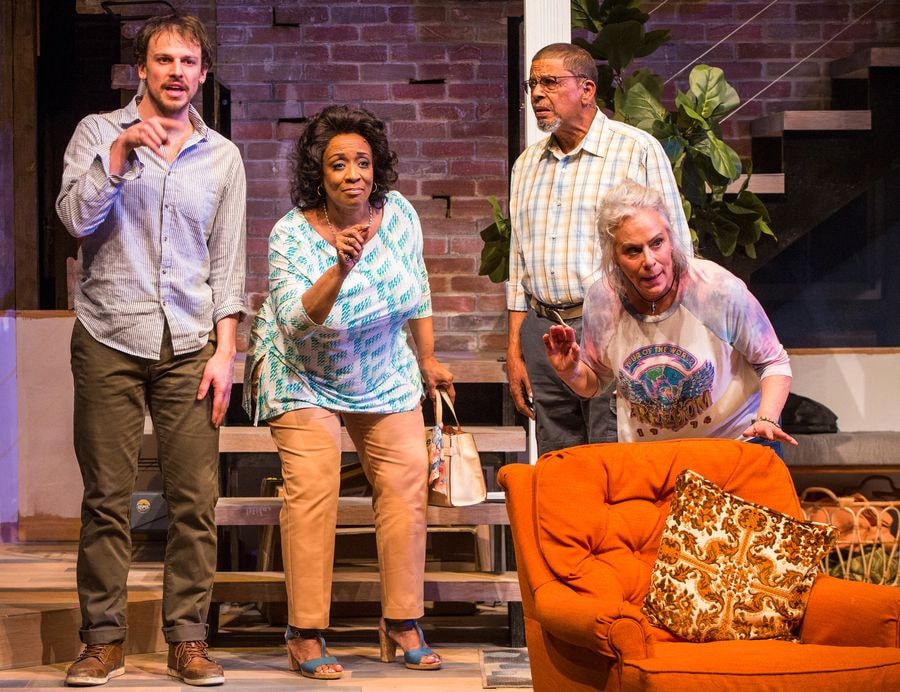Midway through his remarkable spring trifecta—three world premieres debuting in as many months on East Coast stages—playwright R. Eric Thomas has come up with an explanation for the feat.
“So I found this lamp, right, in this cave, and a genie came out,” he joked one afternoon before a matinee of his play The Folks at Home at Baltimore Center Stage.
Magic might be the only way to explain how that production’s March-to-April run overlapped with Thomas’s new Backing Track at Philadelphia’s Arden Theatre Company. And how that twofer barely precedes Crying on Television, on view May 31-June 26 at Baltimore’s Everyman Theatre (with at-home streaming available June 17-July 10).
To be sure, prolific streaks are not out of the ordinary for this author and humorist, who for years wrote a daily current events and culture column for Elle.com, and whose other achievements include writing for Apple TV+’s Dickinson and FX’s Better Things, hosting the Moth storytelling phenomenon in Philadelphia and Washington, D.C., and penning books like his bestselling memoir-in-essays Here for It: Or, How to Save Your Soul in America or his young adult novel (out May 31) Kings of B’more. He also co-wrote (with Helena Andrews-Dyer) Reclaiming Her Time: The Power of Maxine Waters, a biography of the high-profile Congresswoman.
Amid all these creative avenues, the 41-year-old Thomas insisted, “The baseline of my life is theatre.” Even when he was churning out his daily Elle.com column, for instance, he says, “I was just writing a comedic monologue every day.”
Comedy is one of his fortes, as evidenced in his spring burst, even if the three plays also aim beyond the funny bone. Folks is a bittersweet marriage-and-family drama that nods to sitcoms. Backing Track is a rom-com—with karaoke!—that grapples with loss and healing. And Crying on Television is, in the playwright’s words, “sort of a straight-up farce,” albeit one dealing with the themes of loneliness and belonging.
“I feel that comedy is a dilator,” Thomas said. “You’re laughing, and then there’s real human emotion” that slips in. Even when aiming for laughs, he noted, he strives for dramatic fullness and rigor. “Sometimes we forgive potholes or shell characters in some comedies, and that is something that I try not to do,” he said. “I do believe that it is possible to have very solid, funny comedy that also works at the most minute dramaturgical level.”
Thomas’s attraction to the stage dates back to his Baltimore childhood, when he attended plays and relished the operas on Mister Rogers’ Neighborhood. When his parents took him to the musical Sarafina! at the John F. Kennedy Center for the Performing Arts, in Washington, D.C., when he was 9 or so, he was so moved that he burst into tears. “I remember being embarrassed by my response, but also feeling that the response was so correct,” he recalled. “And I was asking my parents, ‘Why did they do that?’ That shifted my relationship with theatre.”

At Columbia University (he also attended University of Maryland, Baltimore County), he answered a call for student scripts with a play about a neighborhood association meeting gone awry. The piece was accepted. “I developed this hunger for the things that made me laugh, made me cry onstage,” he recounted. “I wanted to figure out how to do them on a technical level and also on an artistic level.”
One of the things he was coping with during this time was a sense of being an outsider. As he writes in Here for It, “I have always been black in a white environment, not black enough in a black environment, working-class in an upper-class environment, Christian in a secular environment, questioning in a devout environment, gay in a straight environment. Never quite right.”
But that sense of alienation proved an asset for an author, enhancing his ability to conjure characters in states of unease or transition. “Writing for me is an empathy engine,” he says. “When I’m writing characters in a play, I am always, one, looking for the places where they feel outside of their own experiences; two, wondering whether they’re trying to get back inside or whether they are happy where they are; and three, asking them what they deeply want.”
While in search of what he himself deeply wanted, he moved to Philadelphia, where he met the man who became his husband, a Presbyterian pastor. The two now split their time between that city and Baltimore.
Also in Philly, Thomas connected with Simpatico Theatre, which in 2016 mounted what he calls his first professionally produced full-length play: Time Is on Our Side, about gay history, developed with PlayPenn. The work went on to win a couple of Barrymore Awards, including outstanding new play.
That same year, Thomas posted an impish Facebook paean to a photograph of President Barack Obama, Canadian prime minister Justin Trudeau, and Mexican president Enrique Peña Nieto on a red carpet at a leadership summit (“like they’re the new interracial male cast of Sex and the City….like Tom Ford presents The Avengers….”). The post went viral and led to the Elle.com gig. If Thomas is comfortable with information-age platforms, as this episode suggests, he’s also notably appreciative of an older medium: television.
“I have deep respect for television, I really do,” he said. “The best television writing exists for me alongside the best playwriting.” He traces his esteem back to his youthful days of watching the Baltimore-set Homicide: Life on the Street with his mother, at which point he already “understood that there was something so powerful about a story that has an engine so strong that you sit down and give your time to it every week.”
His regard helped shape Folks, whose premise—involving the unexpected arrival of in-laws at a likeable couple’s home at just the wrong time—nods to sitcoms, and whose characters sometimes watch and talk about TV.
“In Folks at Home I was specifically interested in interrogating ’70s sitcom structure in a theatrical space,” Thomas said. “Not in a satirical way, but saying: What happens after the show ends? How do these characters change? Because sitcoms are about stasis.”
The television theme is “part of the brilliance of this play,” said Center Stage artistic director Stephanie Ybarra. “I read it as unapologetically, overtly theatrical, even as it is in conversation with a medium we tend to think of as more naturalistic or realistic.” While making that kind of meta-cultural commentary, she noted, Thomas “is able to capture the joy and the pain of being a human.”

Screens also feature thematically in Backing Track, whose characters recurrently sing karaoke and watch the movie Titanic. Both plot strands point to an interest of Thomas’s: the few common cultural touchstones that remain in our increasingly siloed world. Karaoke, he pointed out, is intrinsically democratic: “It’s like a church. All you do is bring yourself.”
Amid the karaoke interludes, Backing Track depicts a family coming to terms with death and grief. “Audience members have commented on how moved they were by its exploration of loss,” said Arden producing artistic director Terrence J. Nolen.
But Backing Track is also funny. Actor Brenson Thomas (no relation to the playwright), who starred as the rom-com hero, Avery, marveled at the playwright’s ability to bring in a fast rewrite that would be “jokes, jokes, jokes—and, oh damn, you also landed the emotional core!” The writer “really understands humor,” the actor said. “It just comes so naturally to him.”
It may come naturally, but it’s also the result of years of practice—more of which Thomas got during the shelter-in-place days of COVID-19. “All I did really was write,” he admitted.
No, wait—he also gardened. Too vigorously. “I got carpal tunnel, a back problem, golf elbow, and tennis elbow all at the same time,” he quipped.
Now, as the world moves gingerly into a new phase of the pandemic, Thomas is buoyed by his triple-play spring. In particular, he said, “I’m excited that I’ve had the opportunity to tell these stories that center people of color. I’m excited about hopefully contributing to a theatrical landscape where those stories feel commonplace. They’re remarkable. They’re extraordinary. But they are also part of the core fabric of theatre.”
Celia Wren (she/her) is a former managing editor of this magazine.
Creative credits for production photos: The Folks at Home at Baltimore Center Stage, written by R. Eric Thomas, directed by Stevie Walker-Webb, scenic designer: Sim Carpenter, costume designer: Harry Nadal, lighting designer: Sherrice Mojgani, sound designer: Frederick Kennedy, stage manager: Erin McCoy, assistant stage manager: Avery James Evans; production assistants: Jalon Payton, Eloia Peterson, assistant director: PJ Johnnie, assistant scenic designer: Paloma Locsin, assistant costume designer: Grace Santamaria, assistant lighting designer: Tyrell Stanley, casting: JZ Casting
Backing Track at Arden Theatre, written by R. Eric Thomas, directed by Rebecca Wright, associate director: Alexandra Espinoza, scenic design: Chris Haig, costume design: Asaki Kuruma, lighting design: Natalie Robin, sound design: Jordan McCree, projection design: Taj Rauch, stage manager: Kate Nelson


